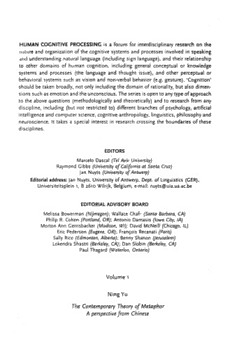Download The Contemporary Theory of Metaphor: A Perspective from Chinese (Human Cognitive Processing) PDF Free - Full Version
Download The Contemporary Theory of Metaphor: A Perspective from Chinese (Human Cognitive Processing) by Ning Yu in PDF format completely FREE. No registration required, no payment needed. Get instant access to this valuable resource on PDFdrive.to!
About The Contemporary Theory of Metaphor: A Perspective from Chinese (Human Cognitive Processing)
The primary objective of this volume is to contribute to the contemporary theory of metaphor from the viewpoint of Chinese, so as to help place the theory into a wider cross-linguistic and cross-cultural perspective. It explores two major questions faced by the contemporary theory: if abstract reasoning is at least partially metaphorical in nature; and what conceptual metaphors are universal, widespread or culture-specific. The book focuses on metaphors of emotion, the "time as space" metaphor and the Event Structure Metaphor. It studies how Chinese is similar to and different from English with regard to these metaphor systems and image schema involved, and what reasons (cognitive or cultural) can account for the similarities and differences between these two languages. The empirial studies presented in this monograph seek to reinforce the view that metaphor is the main mechanism through which abstract concepts are comprehended and abstract reasoning is performed. It argues that certain conceptual metaphors are grounded in some basic human experiences that may be universal to all human beings.
Detailed Information
| Author: | Ning Yu |
|---|---|
| Publication Year: | 1998 |
| ISBN: | 9781556192012 |
| Pages: | 288 |
| Language: | English |
| File Size: | 18.327 |
| Format: | |
| Price: | FREE |
Safe & Secure Download - No registration required
Why Choose PDFdrive for Your Free The Contemporary Theory of Metaphor: A Perspective from Chinese (Human Cognitive Processing) Download?
- 100% Free: No hidden fees or subscriptions required for one book every day.
- No Registration: Immediate access is available without creating accounts for one book every day.
- Safe and Secure: Clean downloads without malware or viruses
- Multiple Formats: PDF, MOBI, Mpub,... optimized for all devices
- Educational Resource: Supporting knowledge sharing and learning
Frequently Asked Questions
Is it really free to download The Contemporary Theory of Metaphor: A Perspective from Chinese (Human Cognitive Processing) PDF?
Yes, on https://PDFdrive.to you can download The Contemporary Theory of Metaphor: A Perspective from Chinese (Human Cognitive Processing) by Ning Yu completely free. We don't require any payment, subscription, or registration to access this PDF file. For 3 books every day.
How can I read The Contemporary Theory of Metaphor: A Perspective from Chinese (Human Cognitive Processing) on my mobile device?
After downloading The Contemporary Theory of Metaphor: A Perspective from Chinese (Human Cognitive Processing) PDF, you can open it with any PDF reader app on your phone or tablet. We recommend using Adobe Acrobat Reader, Apple Books, or Google Play Books for the best reading experience.
Is this the full version of The Contemporary Theory of Metaphor: A Perspective from Chinese (Human Cognitive Processing)?
Yes, this is the complete PDF version of The Contemporary Theory of Metaphor: A Perspective from Chinese (Human Cognitive Processing) by Ning Yu. You will be able to read the entire content as in the printed version without missing any pages.
Is it legal to download The Contemporary Theory of Metaphor: A Perspective from Chinese (Human Cognitive Processing) PDF for free?
https://PDFdrive.to provides links to free educational resources available online. We do not store any files on our servers. Please be aware of copyright laws in your country before downloading.
The materials shared are intended for research, educational, and personal use in accordance with fair use principles.

